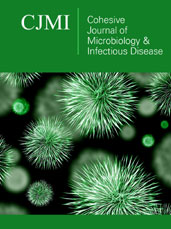- Submissions

Abstract
Cohesive Journal of Microbiology & Infectious Disease
Detection of Antimicrobial Activity of Fenugreek (Trigonella foenum graecum) Extract on Bacteria Isolation from Different Clinical Specimens in Shendi Town, Sudan
-
Open or CloseHala Khalid Mohammed Alfadul¹, Mazin Babiker Musa Bashir¹, Alhaj Saad
Mohamed Ahmed Ali², Ghanem Mohammed Mahjaf¹*
1Department of Medical Microbiology, Shendi University, Sudan
2Department of Public Health, Shendi University, Sudan
*Corresponding author: Ghanem Mohammed Mahjaf, Department of Medical Microbiology, Faculty of Medical Laboratory Sciences, Shendi University, Shendi, Sudan
Submission: December 10, 2024;Published: February 14, 2025

ISSN: 2578-0190 Volume7 Issue3
Abstract
Background: The growing threat of bacterial resistance has spurred the exploration of herbal medicine
as an alternative solution. Fenugreek seed, a remedy with a rich history spanning many decades, has
effectively treated bacterial infections. The key to unlocking the potential of these traditional remedies
lies in research into the bioactive substances found in plants. This research has revealed numerous
therapeutic properties and validated their traditional applications, providing reassurance about the
credibility of herbal medicine. Trigonella foenum-graecum L., one of the oldest medicinal herbs, is
believed to be native to Asia or the Mediterranean region.
Objectives: This work aimed to determine the antimicrobial activity of Fenugreek (Trigonella foenum
graecum) Extract on Bacteria Isolation from Different Clinical Specimen.
Methodology: It is a prospective cross-sectional study performed in Shendi City, Sudan, from December
2022 to January 2024, at the Microbiology lab, Faculty of Medical Laboratory Science. In this study,50
samples were collected from microbiology labs in Shendi City and identified using gram stain and
biochemical tests. The susceptibility of gram-positive and gram-negative bacteria to the fenugreek was
determined. We tested the fenugreek extract using the agar well diffusion method at 100%, 50%, and
25% w/v concentrations.
Result: Out of 50 clinical specimens, we identified 13 males and 37 females. Among the different clinical
samples tested were thirty-five urine samples, ten wound swabs, two ear swabs, one blood, one sputum,
and one aspirate. The clinical isolates were tested as follows: Escherichia coli 30%, Staphylococcus aureus
26%, Pseudomonas aeruginosa 14%, Serratia marcescens 10%, Providentia 6%, Citrobacter 4%, Proteus
mirabilis 4%, Proteus vulgaris 2%, Klebsiella pneumoniae 2%, and Saprophytic 2%. Notably, all organisms
showed 100% resistance to fenugreek. These results highlight the pressing need for further research
using advanced extraction techniques.
Keywords:Antimicrobial; Fenugreek; Extract; Herbal medicine
 a Creative Commons Attribution 4.0 International License. Based on a work at www.crimsonpublishers.com.
Best viewed in
a Creative Commons Attribution 4.0 International License. Based on a work at www.crimsonpublishers.com.
Best viewed in 







.jpg)






























 Editorial Board Registrations
Editorial Board Registrations Submit your Article
Submit your Article Refer a Friend
Refer a Friend Advertise With Us
Advertise With Us
.jpg)






.jpg)














.bmp)
.jpg)
.png)
.jpg)










.jpg)






.png)

.png)



.png)






